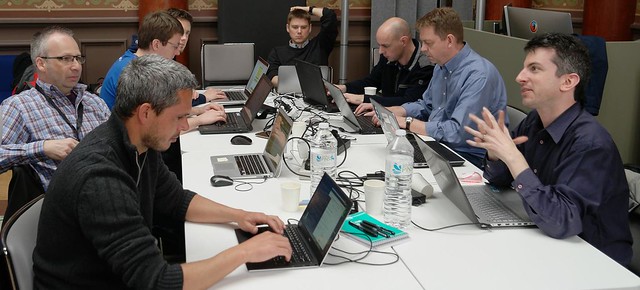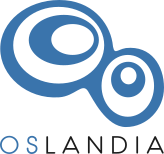At the end of February, Mozilla Paris hosted the annual OSGeo “C tribe” Code Sprint. Around 50 developers from several Open Source GIS projects gathered to work together.
C Tribe OSGeo Code Sprint, 2016 Paris edition
The “C tribe” code sprint was originally born in North America, almost a decade ago. It took place in Europe for the first time in 2014 (Vienna edition).
Vienna was a successful event, and an incitation to alternate the location between the old and the new continent.
This allows for more local developers to attend, and new places to visit. This is why we landed in Paris.
This event can be seen as a collection of several smaller sprints (several projects involved), each with its own agenda : https://wiki.osgeo.org/wiki/Paris_Code_Sprint_2016#Project_Plans
But in the meantime each attendee benefits from all resources gathered. This really makes a difference for some issues..
During a code sprint, coding obviously takes a central place. But discussions about projects orientations and software design are as important.
And most important is also all informal exchanges between participants.
You can have a look at Vincent’s pictures on Flickr .
A special event
This event had its special taste and color, thanks to some exceptional aspects:
- The venue itself really helped ! Located in the very center of Paris, the main room is magnificent ; perfect mix beetween old fashion style ala Versailles (this place used to be an ambassy) and latest high tech facilities. From a symbolic point of view, Mozilla Paris offices could be seen as an Open Source temple, using the old aristocratics power’s codes. It also conveys the message that Open Source is no longer only written in underground places.
- Each project was encouraged to define its own agenda before the sprint (as linked above). This is a good bootstrap for the first day.
- I also wanted to enlarge the attendees list, to people not used to attend OSGeo Code Sprints. So we reached out to other communities and organizations and invited them to join. All of them apparently enjoyed a lot the experience. We can be proud of the OSGeo’s community to be able to welcome new energies, faces and skills.
- In a similar way, during the second evening, we opened the doors to a external people curious to see how a code sprint look like. Participants had the opportunity to briefly present what they were working on, in front of the whole audience. Giving a chance to share the knowledge, and the following buffet, was a really nice moment.
- A strong attention has been paid to the locations for evening events, as well as food and drinks quality.
This may be French way of life, but it really improves the social side of the event.
It apparently paid off, as sprinters seems enthusiastics: https://wiki.osgeo.org/wiki/Paris_Code_Sprint_2016_:_Feedback

Yes, it was worth it !
Gathering around 50 developerss, during almost a week, represents more or lesse one man-year effort, plus extra resources ( travel fees & more). Was it worth it ?
As an organizer, I obviously think it was !
A code sprint really changes the way developers interact with each other. Tough discussions are much easier face to face than on IRC or mailing list, and decision-taking is greatly improved. Spending a week close to the others changes the way you interact afterwards and ease communications. Moreover, finding highly skilled people in the same room makes problem solving simple, as someone almost always has the right answer to any tricky issue.
This sprint helped create many bridges, be it between individuals, organizations or projects. Most of them will grow into new interactions in the coming weeks and months. The event was also a good way to inject new energy into the community, and welcome newcomers into this growing set of people, for the best of OpenSource geospatial technologies.
Therefore, a lot of “Mercis” to all who contributed to this event: https://wiki.osgeo.org/wiki/Paris_Code_Sprint_2016_:_Thanks

